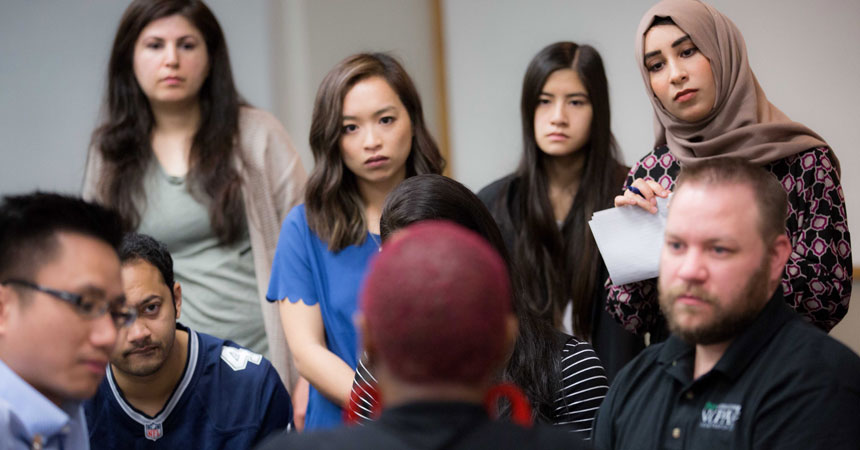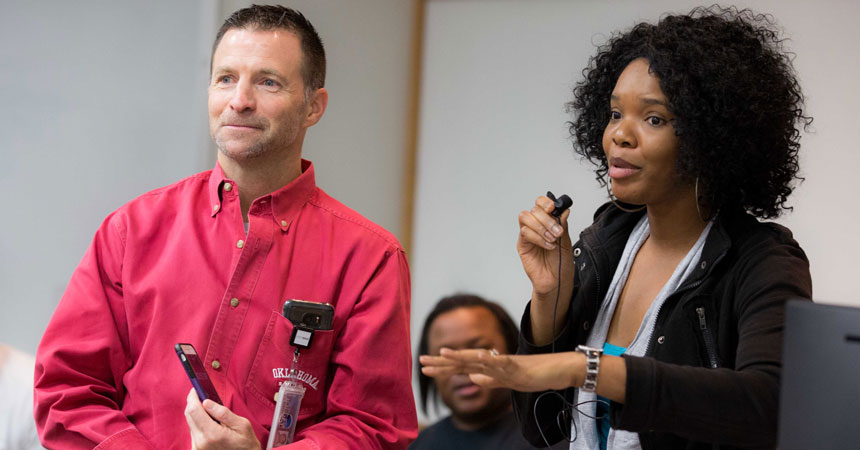For pharmacy class, a lesson in living with HIV
By Jan Jarvis

Shelia Neal can’t recall much of what happened on the day she learned she was HIV positive because of the sheer shock of it all.
But one thing stands out.
“Until then, I had never had a doctor bend down and look at me eye-to-eye,” she said. “But she did, and she held my hand, too.”
Such compassion is exactly what Patrick Clay, PharmD, hopes to inspire through his “Persons with HIV” panel for third-year pharmacy students. Now in its fourth year, the panel provides a way for students to learn real and meaningful information directly from individuals with HIV.
HSC InsiderLearn more about UNTHSC’s people and programs by signing up for the weekly HSC Insider email. |
“There is no more powerful way to accomplish this than sitting students down in front of patients who are living with the disease,” said Dr. Clay, Professor of Pharmacotherapy in the UNT System College of Pharmacy. “Using patients as teachers, especially in a stigmatized disease like AIDS, has revolutionized the value of the lesson to the students.”
For about two hours, the patients talked about their diagnoses and offered insight into the challenges faced by people who are HIV positive as they navigate the health care system. After learning about how patients moved from diagnosis to their current status, students from each group presented the case to the whole class.
Neal told her group that she learned she was HIV positive in 2017 when she was about to start treatment for Hepatitis C. She had no symptoms and doctors believe the virus had been dormant for 20 years.
Although Neal has enjoyed many enriching experiences since her diagnosis, it has not been without a downside. There are still people who are afraid to drink after her or eat food she has made, she said.
“We have people who are still living in 1986,” Neal said. “You just can’t change some people’s mind.”
While the pharmacy students asked many questions about medications, side effects and costly prescriptions, what they seemed to really want to know was what life was like with HIV.

Mandy Mobley had been married three years when, in 1996, she learned she was pregnant and HIV positive on the same day.
“My ex-husband infected me and several others,” she said.
Today her viral load is undetectable, and she has two healthy sons. But she remembers how her health care provider shamed her for getting pregnant.
“The doctor made me feel really bad,” she said.
Wilburn Mitchell was told he was HIV positive nine years ago, but the virus is non-progressive and he has never taken medications for it. Angry at first, he eventually learned to cope with the diagnosis.
“People are so scared, and they feel like there’s no outlet to talk about it,” he said. “But you’ll destroy yourself if you don’t talk about it and get those emotions out.”
Neil warned the students that she hates it when health care providers ask how she got the virus.
“That’s none of their business,” she said. “Unless you can cure it, there’s no reason to talk about poor decisions I made during my younger days.”
Student Ije Chukwu, who presented Neal’s case, was impressed by Neal’s dedication to staying healthy.
“She never misses a dose of her medications,” she said. “She is the ideal patient.”




Social media